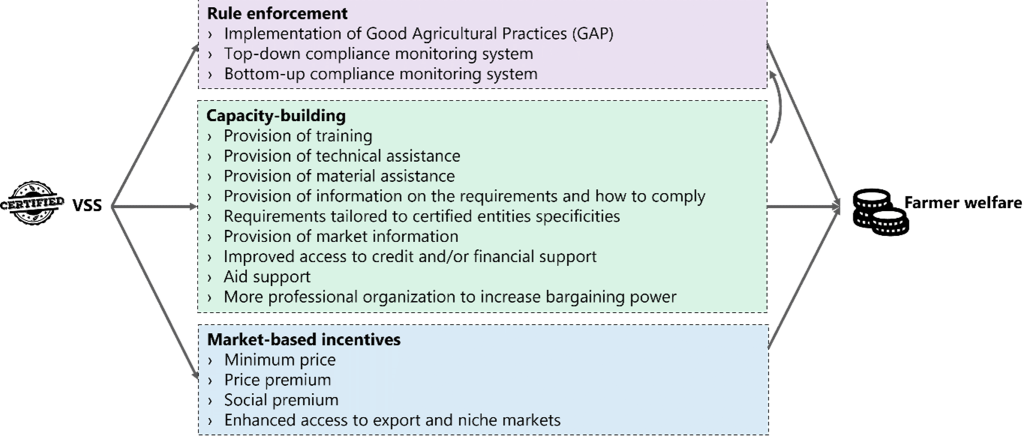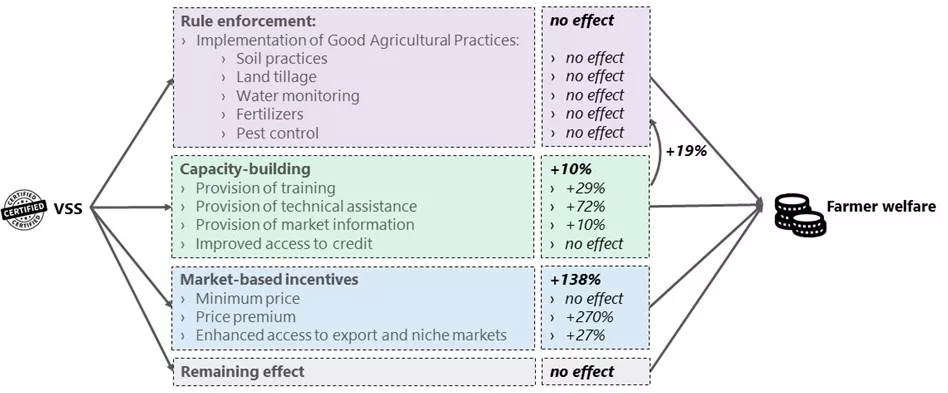Voluntary sustainability standards (VSS) have gained prominence worldwide as a market-based tool to improve sustainability, especially in low- and middle-income countries where smallholder farmers dominate agricultural production. VSS are designed to foster sustainability through different governance mechanisms, which can take the form of “carrots” or “sticks”. Whilst VSS have been subject to much research attention, a vital gap in the evidence base remains: how does their governance design affect their impact? Our recent study examines how different VSS governance mechanisms affect farmer welfare in Peru, providing avenues for improving VSS design.
How VSS affect farmer welfare
We identified three main governance mechanisms through which VSS might impact farmer welfare (below). These three mechanisms include rewards (“carrots”) and punishments (“sticks”) which aim to ensure that producers implement sustainability practices, which can in turn improve farmer welfare.
- Rule enforcement (“Sticks”): VSS necessitate compliance with a series of requirements or recommendations related to sustainable production. For example, farmers complying with Good Agricultural Practices (GAP) might produce higher-quality crops that fetch better prices, but at potentially higher costs.
- Capacity-building (“Carrots”): VSS can offer technical and financial support to assist farmers in improving their welfare, either directly or indirectly via better rule enforcement. For instance, training on soil quality can increase yields, reduce input costs, and improve compliance with certain GAP.
- Market-based incentives (“Carrots”): VSS can guarantee the presence of market incentives to compensate producers for the costs of implementing sustainable production practices. For example, price premiums for certified products might directly improve farmer welfare.
Identification of three main VSS governance mechanisms for farmer welfare impacts

We quantitatively tested the effect of VSS on farm revenue through the three governance mechanisms and compared their relative importance. To do so, we analyzed data from a national survey of around 7,500 smallholder farms in Peru over four years (2016-2019) and conducted interviews with various supply chain actors. The most common VSS among smallholders in Peru include Fairtrade, Organic and GlobalGAP, primarily for banana, coffee and cocoa production. Many smallholder farms are certified through farmer organizations, so we also examined the potential co-benefits and trade-offs of VSS adoption and membership in a farmer organization.
Key findings: Carrots over Sticks
Our findings (below) show that “carrots” (market-based incentives and capacity building) are more effective at improving farm revenue than “sticks” (rule enforcement). However, the overall effects are not strong enough to lead to significant overall revenue gains. Here is a closer look:
- Market-based incentives lead the way: Market-based incentives have the largest effect on farm revenue, increasing it by 138%. This is mainly through price premiums followed by improved market access, while minimum prices (applied only by Fairtrade) showed no effect.
- Capacity building follows in second place: Capacity building increases farm revenue by 10%. More specifically, technical support, followed by training and market information contribute the most. Access to credit currently has no effect because certified farmers do not have better access compared to non-certified ones. However, if access to credit were improved, it has the potential to significantly boost farm revenue according to our data. Capacity building also positively affects compliance with GAP by 19%, helping less well-off farms to implement VSS effectively.
- No evidence through rule enforcement with GAP: We find no significant evidence that rule enforcement of GAP improves farm revenue in Peru. This is surprising, as VSS are expected to enhance farming systems and yields. However, we identify the potential revenue-enhancing effects through compliance with GAP related to land tillage, water monitoring, and pest control. We find that 27% of Organic certified farms still use inorganic pesticides. Issues like impractical requirements, poor translation, and enforcement in the field, or farmers being unaware of their certification status, contribute to non-compliance.
- Co-benefits between cooperative membership and market-based incentives: Membership in a cooperative reinforces the effect of market-based incentives but not other channels. Additionally, we find that membership in farmer organizations plays a more important role in receiving capacity building than VSS adoption alone.
Summary of the estimated effects of VSS on farmer revenue through the three governance mechanisms

Practical implications: Strengthening VSS for better outcomes
So, what does this mean for VSS organizations and sustainability interventions more broadly? Our study shows that VSS governance matters. There is an opportunity to significantly boost farmer welfare among smallholders in Peru. We propose three ways for standard-setting organizations to enhance VSS governance and promote economic sustainability:
- Strengthen both “carrots and “sticks” to boost farmer welfare: This is most effectively done through providing price premiums rather than guaranteeing minimum prices; through improving access to credit next to technical assistance and training, and through enhancing standard setting and enforcement related to practices like land tillage, water monitoring, and pest control.
- Better balance of “carrots” and “sticks” in VSS design: Even though “carrots” work better than “sticks”, there needs to be a balance. Interviews with stakeholders indicate that an overemphasis on “carrots” can lead to a proliferation of standards and an oversupply of certified products. This proliferation occurs as new VSS emerge to accommodate different levels of producer capabilities and to cater to varying niche markets, while oversupply occurs by incentivizing producers via the “carrots” to adopt VSS and produce greater quantities. This might lead to reduced price premiums, hindering the implementation of sustainability practices that require high costs and effort.
- Consider the varying effects of farmer organizations: Farmer organizations play an important role in smallholder certification, but their impact on VSS governance mechanisms differs. They do not significantly improve rule enforcement. However, they play a more important role in capacity building than VSS alone and the combination with VSS enhances market-based incentives through synergistic effects. A tailored approach in standard implementation strategies and enhanced engagement with stakeholders in the field is needed.



